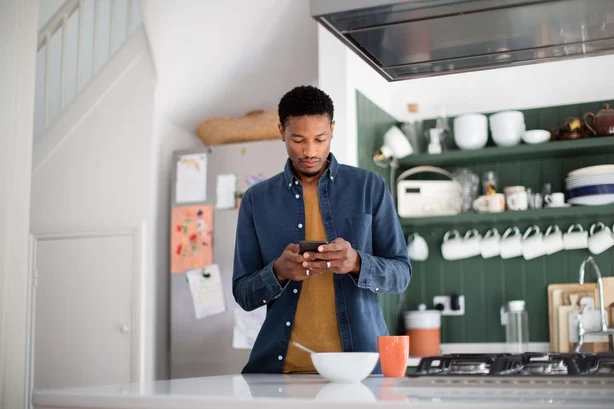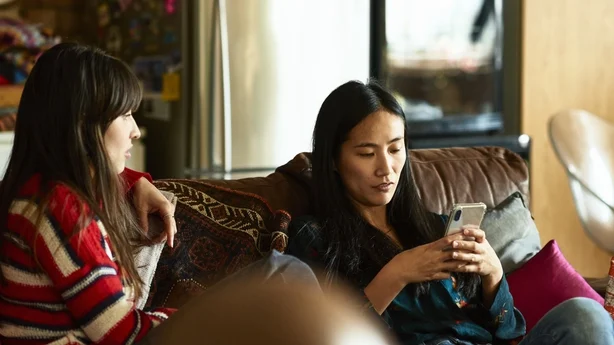Checking each others’ phones in a relationship is a contentious subject. Is it OK to expect access to your partner’s phone? Is it ever OK to do it behind their back? And what does it say about your partnership if you’re tempted to have a look?
Sex, relationship, and trauma therapist, Cate Campbell says: "Temptation to check your partner’s phone should be resisted. If you are feeling tempted to check it, it’s important to consider the effect it may have, what you’re hoping to gain, and what alternatives there are to meet your needs.
"When there’s something you’re looking for, a frank conversation is often far more effective than snooping.
"If you have suspicions around fidelity, for example, are you looking for reassurance or trying to catch your partner out? If you find nothing, will you really be reassured? And if you do find something worrying, how will you feel and what will you do? Rather than a discussion about what you’ve discovered, you risk a confrontation about how you made your discovery.
"It’s far better to be honest with your partner about your doubts, so they can provide genuine reassurance, or you can find out if your concerns are justified."
Could it cause damage to the relationship?

"Even when there are no trust issues, casually looking through someone’s phone is likely to create them. It’s a huge boundary violation, which is likely to upset the phone’s owner and change the way they feel about you. We are all entitled to privacy, and looking through a partner’s phone shows a lack of respect for this fundamental right," Cambell says.
"Sometimes people justify this because they’ve been let down in previous relationships and have high anxiety around fidelity. However, a new partner is likely to be hurt if you go through their phone, rather than talking to them about your concerns and fears.
"What happened in the past isn’t the new partner’s responsibility and doesn’t justify giving in to the impulse to check. A partner may well feel that it doesn’t say much for the strength of your relationship if you are willing to overstep.
"Even couples who see checking one another’s phone as a sign of trust may change their minds if it’s done when they’re not around. Most couple therapists would discourage this anyway, as checking really suggests the opposite of trust. It’s something that couples often agree following an affair, but all it really does is highlight that trust has been lost – creating defensiveness and fear."

Is there an element of control?
"Checking can also be a toxic form of control. The relationship is unlikely to be healthy if this is the only way someone can feel secure. And just because a partner has agreed to checking doesn't mean they’re really comfortable with it.
"People sometimes agree to phone checking because a request to do so takes them by surprise, or even because they’re afraid of the other’s reaction if they refuse. How can that ever be OK?"
What if they’re always on their phone?
It might spark feelings of suspicion and jealously if one partner is glued to their mobile, but Campbell says: "Rather than examining one another’s social media, emails and calls, it’s more productive to be honest about how a partner’s preoccupation with their phone makes you feel.
"It’s worth looking at how together you can jointly create boundaries around phone use and interaction with others on social media, as this helps to prevent unintentional violations – it can also offer reassurance that you’re both on the same page.

But what if checking makes me feel less anxious?
"Some of us are very anxious about relationships and see refusal to allow phone checking as a red flag. But, actually, the need to check is more of a justifiable concern," she says.
"It’s a major ethical issue to feel entitled to access a partner’s phone. The more someone feels they must do so to allay their fears, the more anxiety they may cause for themselves.
"Continuing anxiety in relationship after relationship is likely to create problems rather than solve them, and inevitably lead to conflict if there is chronic lack of trust. It makes much more sense for someone with anxiety to explain this to their partner and to try to look for positive signs, rather than obsessing about negative ones.
"If this feels impossible, therapy is often the quickest and most effective way to learn how to regulate runaway emotions. You could try both individual therapy, to help manage anxiety and settle earlier relationship trauma, and couples therapy, to help prevent relationship damage."
You can find an accredited therapist through the Irish Association for Counselling and Psychotherapy (IACP.ie).
If you have been affected by issues raised in this story, please visit: www.rte.ie/helplines.
Disclaimer: The copyright of this article belongs to the original author. Reposting this article is solely for the purpose of information dissemination and does not constitute any investment advice. If there is any infringement, please contact us immediately. We will make corrections or deletions as necessary. Thank you.






